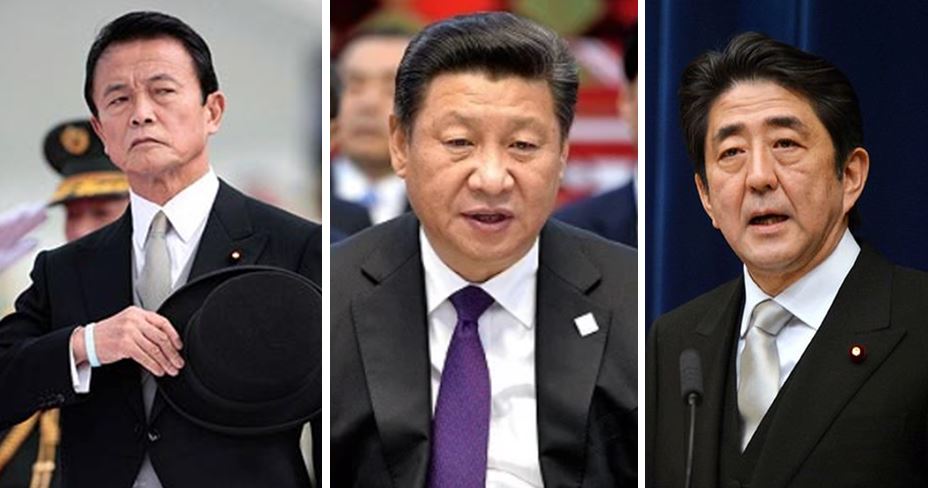Japan’s longest-serving Prime Minister Shinzo Abe has stepped down from his post citing health issues. The Japanese leader is known to suffer from ulcerative colitis, a chronic condition, and hence in a news conference remarked that he did not want his illness to lead to mistakes with important policy decisions. Abe also apologized to citizens from the bottom of his heart for not being able to fulfill his duties.
The severity of his condition was partly responsible for forcing him out of office after just a year during his previous term as prime minister in 2007. With Abe bowing out, and for good this time from Japan’s bureaucracy, a fight to the finish for the PM post has ensued in the ruling Liberal Democratic Party (LDP). However, two clear leaders have emerged as having the potential and required expertise to take the mantle from Abe.
Taro Aso
The first candidate is Abe’s deputy and finance minister Taro Aso. The 79 year-old leader has been a core member of Abe’s administration. Just like Abe, Aso has no love lost for China. Post Corona, Aso has been on the front foot for taking Xi Jinping and his lackeyzs to the cleaners
Calling WHO Chinese Health Organisation
The Japanese Deputy PM Taro Aso in April while addressing lawmakers at the House of Representatives in Tokyo, had said that the World Health Organisation might have to change its name to “Chinese Health Organisation”. Aso had lent his support to a petition terming Tedros Adhanom Ghebreyesus unfit for the role of the WHO chief.
“At least the petition has received 500,000 signatures. People think the World Health Organization should change its name…it shouldn’t be called the WHO, it should be renamed the CHO (or Chinese Health Organization). This is truly resonating with the people,” Aso had said.
Japan's Deputy Prime Minister and Finance Minister Taro Aso said on Thursday that the petition came as many people worry the World Health Organization may have to change its name to the "Chinese Health Organization."
WHO🔜🔜🔜CHO @AbeShinzo @WHO pic.twitter.com/pl1suxLfm9— UyghurInfo (@UyghurInfo) March 27, 2020
Reflecting on the relations of India and Japan with China, Aso on previous occasions has explicitly said that despite sharing land boundaries with India and maritime contacts with Japan, Beijing has never been close to either.
“India shares a land border with China, and Japan has had maritime contacts [with China], but for the past 1,500 years and more there has never been a history when our relations with China went extremely smoothly,” Aso said.
The new world order that has been emerging in the South China Sea and the Indo-Pacific region to cull the threat of China has seen active participation of Japan. The island country having the third-largest economy in the world is part of the Quad comprising India, the USA, and Australia.
Aso has called for close defense co-operation between Japan, Australia, India, and the United States to ensure regional stability. His aforementioned statements are enough to gain him the advantage of leading the work left behind by Abe. Japan is in the midst of reeling its companies back from China for which it had earmarked $2.2 billion.
Read: Pack up and get out of there,’ Japan to spend $2.2 billion to get Japanese companies to exit China
Taro Kono
The other candidate, the 56-year-old Defence Minister Taro Kono has a reputation of a maverick, although he has never gone beyond the party line and more often than not has toed the line on key Abe policies, including a stern stance against China.
Historically, Tokyo does not share a pleasant relationship with Beijing. The territorial disputes and World War II embittered grievances have marred the Japan-China relationship for decades. Add to it, China trying to enforce its hand in the South China Sea which really hasn’t gone down well with Japan.
Kono in an interview with American Daily had taken a dig at China for trying to change the status quo of South China Sea.
“Anyone who is trying to change the status quo by force needs to be forced to pay a high cost,” said Kono in the interview.
Commenting on China stationing missile batteries and deploying fighter jets and bombers on several newly created islands in the South China Sea, the Defence Minister noted:
“That is destabilizing,” he said. “A free and open maritime order in the South China Sea is as important as any other place and what happens there … will concern the international community.”
Tarō Asō and Taro Konohas are one of the two leaders in Japan that have raised their hands when it has come to taking on China. While Beijing might have taken a sigh of relief after Abe stood down, his successors that are expected to assume the chair are even more rebel when it comes to policies on China. Seems like Beijing just cannot catch a break.
